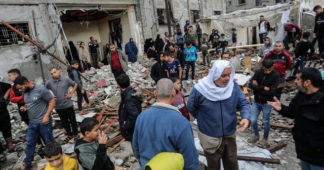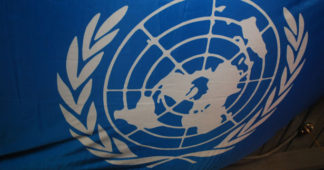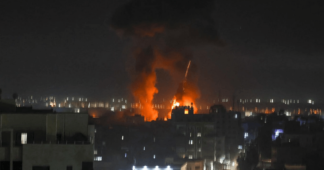Cape Town calls on court to halt Israel’s military campaign in Gaza, calling it necessary to protect rights of Palestinian people
Dec 29, 2023
South Africa on Friday launched a case for the International Court of Justice (ICJ) to declare that Israel is committing genocide against Palestinians in its military campaign in Gaza.
The submission from Cape Town, which says that Israel is in breach of its obligations under the Genocide Convention, calls for a halt to Israel’s military operations in the besieged enclave. It said such an order is “necessary in this case to protect against further, severe and irreparable harm to the rights of the Palestinian people”.
“Israel has engaged in, is engaging in and risks further engaging in genocidal acts against the Palestinian people in Gaza,” South Africa’s application said.
It said it had requested that the ICJ declare “on an urgent basis that Israel is in breach of its obligations in terms of the Genocide Convention, should immediately cease all acts and measures in breach of those obligations and take a number of related actions”.
The submission is the latest move by South Africa to put pressure on Israel to end its war on Gaza. Last month, lawmakers in the country voted in favour of closing down the Israeli embassy in Pretoria and severing diplomatic ties with Israel until a ceasefire was agreed upon.
Israel vehemently rejected the Friday announcement by South Africa, calling the case “baseless” and then going on to blame Hamas for the suffering and deaths of the Palestinian people in Gaza.
“Israel has made it clear that the residents of the Gaza Strip are not the enemy, and is making every effort to limit harm to the non-involved and to allow humanitarian aid to enter the Gaza Strip,” the Israeli foreign ministry said in a statement.
The ICJ is one of the six principal organs of the United Nations and is separate from the International Criminal Court (ICC), which tries individuals for war crimes and crimes against humanity. While the court settles disputes between countries, it has no power to enforce its opinions despite them being legally binding.
Analysts have previously told MEE that while the ICJ’s decisions are difficult to enforce, they can help shift narratives around the world. And weighing in on whether Israel is committing genocide could cause serious harm to Israel’s international reputation.
War broke out in Israel and Gaza on 7 October, when Hamas and armed Palestinian groups launched an attack on Israel that killed 1,200 Israelis and other nationals, according to the government death toll.
Meanwhile, Israel has killed more than 21,000 Palestinians in its aerial bombing campaign and ground assault, with the majority killed being women and children, according to the Palestinian health ministry.
Israel’s military forces have targeted many types of civilian infrastructure, including hospitals, residential neighbourhoods, ambulances, and mosques. Entire neighbourhoods in the besieged enclave have been completely levelled.
The UN’s Genocide Convention and the Rome Statute of the International Criminal Court define genocide as acts “committed with intent to destroy, in whole or in part, a national, ethnical, racial or religious group”.
Legal experts, UN officials and more than 800 scholars have already warned that Israel is potentially committing genocide against Palestinians.
South Africa has long supported Palestinian statehood and has also equated the plight of Palestinians to those of the Black majority in its own country during the time of apartheid. Israel vehemently denies it engages in apartheid. However, several leading international human rights groups have said that Israel is engaging in apartheid practices in its treatment of Palestinians.
We remind our readers that publication of articles on our site does not mean that we agree with what is written. Our policy is to publish anything which we consider of interest, so as to assist our readers in forming their opinions. Sometimes we even publish articles with which we totally disagree, since we believe it is important for our readers to be informed on as wide a spectrum of views as possible.











